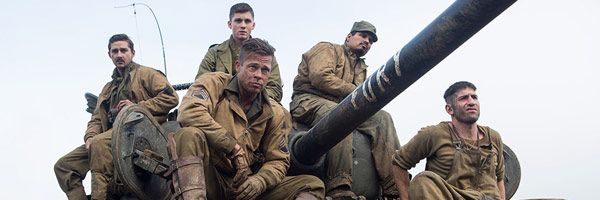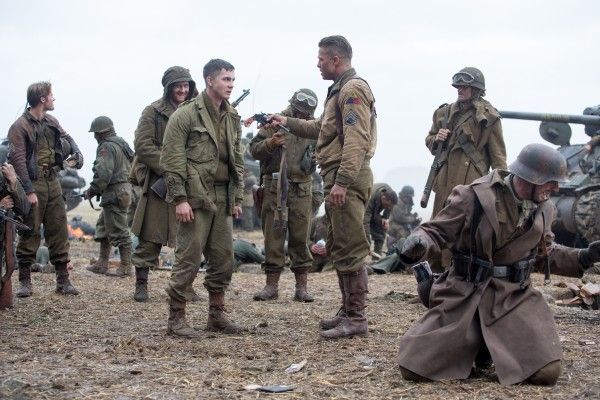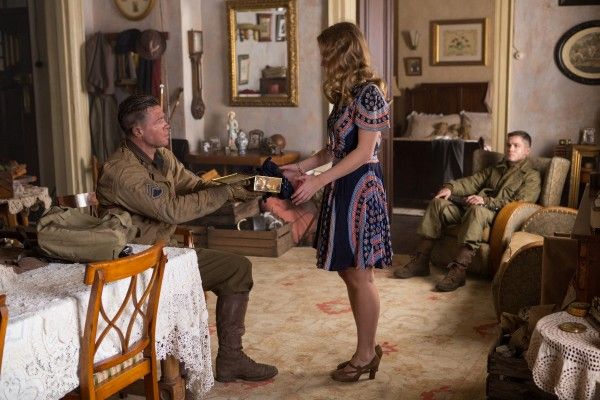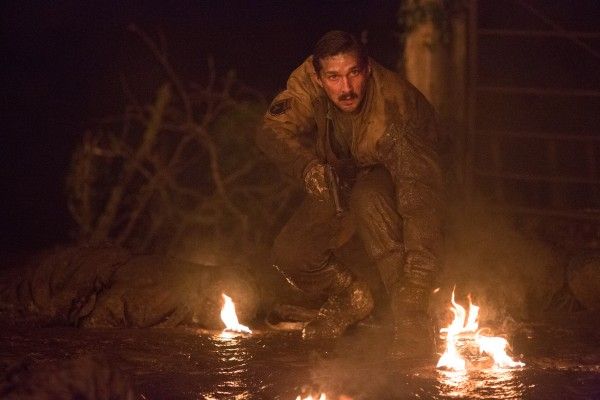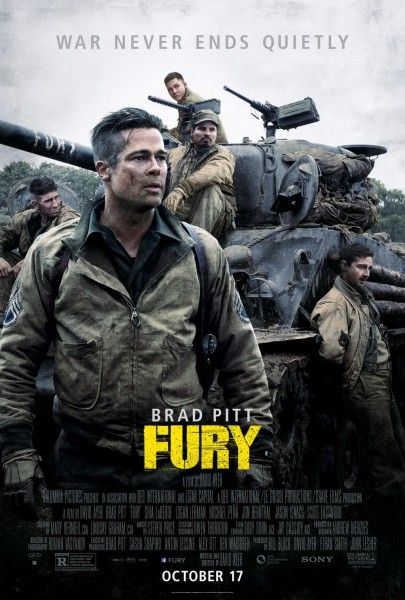If "war is hell," then every soldier is a sinner. It would be nice to think that every American who fought in World War II was a saint, but we know that's not the truth. War makes monsters because it has to, and we have to live with that ugliness because it's in service of defeating a greater evil. Since we as Americans accept without question that Nazis are evil and deserved to be killed en masse, writer-director David Ayer turns the problem of morality towards American soldiers with his new movie, Fury. Despite strong central performances from Brad Pitt and Logan Lerman, Ayer's picture ultimately feels hollow as the spectacular action and stomach-churning violence never take us anywhere beyond what we already know: war is hell.
World War II is coming to an end, and Allied forces are moving into Germany. Led by Don "Wardaddy" Collier (Pitt), the members of the tank "Fury"—Boyd "Bible" Swan (Shia LaBeouf), Trini "Gordo" Garcia (Michael Peña), and Grady "Coon-Ass" Travis (Jon Bernthal)—have lost their longtime comrade, and are now stuck with Norman Ellison (Lerman), a fresh recruit and filing clerk who is completely out of his element. As Fury grinds towards Berlin, Norman witnesses the horrors of war firsthand and learns to accept that ideology has no place on the battlefield.
Although we're in the tank for a majority of the picture, the main characters are really Wardaddy and Norman. Bible, Gordo, and Coon-Ass mostly serve to illustrate how hardened the crew has become. They're the end result of years of war and that result is either overbearing piety (true to his name, Bible prays a lot) or viciousness to the point where Coon-Ass is basically irredeemable although the movie makes a half-hearted attempt to humanize him late in the picture. As for Gordo, he's barely there at all, and it's really a waste of Peña as well as LaBeouf and Bernthal to give them such limited characters.
Thankfully, the lead story between Wardaddy and Norman is really all the movie needs to make its point about how war changes men since we have two guys from the opposite ends of the spectrum. Wardaddy has been ruined by war and ruthlessly killing Germans, including those who have surrendered, and his attitude is essential to his identity. He needs to let the violence impulses run free in wartime, but Pitt gives us the slight impression that Wardaddy behaves this way so perhaps he can somehow return to civilian life by clearly delineating the battlefield from domestic life. But before that time comes, he's going to draw Norman into the harsh reality of war where being merciless—even if it's against children—is the only way to survive. Lerman once again gives a terrific performance, and it's a joy to watch him grow as an actor and take on more challenging roles. There is an element of Norman being the audience surrogate and representing "the loss of innocence", but he makes it feel as real as Ayer will allow.
For the first half of the movie, I was entranced by Fury and applauded its uncompromising approach to war. It is unrelentingly violent, and although the violence is mostly towards Nazis, the bloodshed is the great equalizer. We're not going to weep over their deaths, but Ayer makes sure we're not cheering either. Watching an German limb fly off is just as disturbing as when it happens to an American.
The problem with Fury is that Ayer can't find a way to expand past the ugliness of war. He's made almost the entire movie the equivalent of the first act of Saving Private Ryan complete with spectacular action, a naïve soldier, and a hardened leader, although Wardaddy is much darker than Tom Hanks' Captain Miller. There's not much room for nuance because Ayer keeps hammering home the same point—war kills everything even remotely humane. There's no room for anything except the bond between soldiers, a sentiment that's lessened when you consider that three of the tank members don't have much in the way of personality.
At one point, Wardaddy tells Norman, "Ideals are peaceful; history is violent," and Fury has a whole lot of violence to show that people are capable of any atrocity on the battlefield. I admire that the men of Fury aren't good guys but we get the idea that they've become bad through war. They were all Normans at one point, but surrounded by so much horror, it's almost impossible to avoid taking on a new identity in order to make it through hell. It's the only way for them to survive. Unfortunately, much like their tank, Fury can hit with a bang, but there's never much room to maneuver.
Rating: B-

